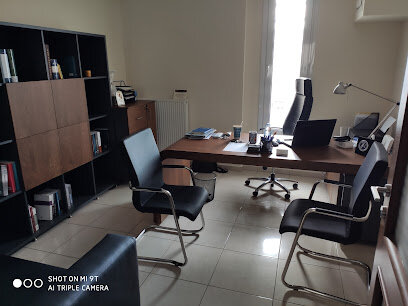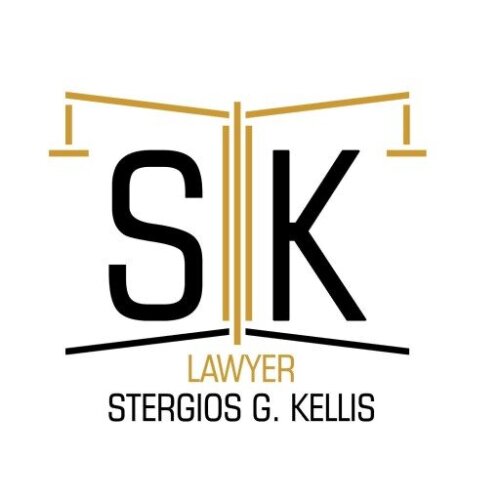Best Admiralty & Maritime Lawyers in Xanthi
Share your needs with us, get contacted by law firms.
Free. Takes 2 min.
List of the best lawyers in Xanthi, Greece
About Admiralty & Maritime Law in Xanthi, Greece
Admiralty and maritime law covers legal matters that arise on or near the sea and other navigable waters. In Xanthi, Greece, maritime issues touch both commercial activity and coastal or inland waterway use. The region is part of northern Greece with a coastal zone and nearby ports serving fishing, local commerce, and recreational boating. If you operate a vessel, employ crew, carry cargo, or are involved in an accident on the water near Xanthi, national maritime law combined with international conventions will apply.
Maritime disputes in Greece are handled by national courts and administrative authorities, and they are influenced by EU rules and international treaties that Greece has ratified. Local port authorities and the Hellenic Coast Guard play active roles in enforcement, safety, pollution response, and incident reporting. Because maritime law combines elements of contract law, tort law, administrative law and international law, many situations benefit from specialist advice.
Why You May Need a Lawyer
Maritime cases can be legally and factually complex, with strict procedural rules, short time limits and multiple authorities involved. You may need a lawyer if you face any of the following common situations:
- Vessel collision, grounding or other accidents causing damage, personal injury or death. Lawyers help with reporting obligations, preserving evidence and pursuing or defending claims.
- Crew claims for wages, personal injury, repatriation or wrongful termination. Employment at sea involves special protections and remedies.
- Cargo claims and carriage disputes involving damage, delay or loss under charter parties, bills of lading or transport contracts.
- Ship arrest, detention or the enforcement of maritime liens and mortgages. Arresting a vessel or defending against arrest requires quick legal action.
- Pollution incidents, illegal discharges or wreck removal. Environmental rules are strict and authorities may impose fines and remediation obligations.
- Salvage and towage disputes, including claims for salvage reward or liability for negligent assistance.
- Marine insurance and indemnity disputes, where policy interpretation and coverage issues arise.
- Recreational boating matters, such as licensing, fines, accidents with third parties, or disputes over marina services and moorings.
Local Laws Overview
Greek maritime law is developed from national statutes, EU regulations and international maritime conventions that Greece has ratified. Core topics that apply in the Xanthi area include vessel registration and certification, safety and inspection requirements, crew employment standards, pollution prevention and response, and port state control inspections.
Jurisdiction - Maritime disputes are generally heard in Greek civil courts. For urgent measures like ship arrest, owners or claimants may seek interim relief from competent courts near the port where the vessel is located. Procedural rules for maritime claims may differ from ordinary civil claims, and timelines can be short.
Port and coastal enforcement - Local port authorities and the Hellenic Coast Guard are responsible for enforcing navigation rules, safety standards, search and rescue coordination and environmental protection. They may initiate administrative proceedings and apply fines or detention measures.
International conventions and EU law - Rules from SOLAS, MARPOL, the International Convention on Civil Liability for Oil Pollution Damage and other instruments inform national practice. EU regulations also affect safety, crewing, passenger rights and environmental obligations for vessels operating in Greek waters.
Commercial documentation - Bills of lading, charter parties and insurance policies determine many commercial rights and duties. Greek courts will interpret these contracts alongside statutory maritime rules. For international shipping, choice of law, jurisdiction clauses and arbitration agreements are common and can affect where and how disputes are resolved.
Frequently Asked Questions
What should I do immediately after a boating accident in Xanthi?
First ensure safety - get medical assistance for injured persons and notify the Hellenic Coast Guard and the local port authority. Preserve the scene as much as possible - take photos, note witness details, record times and conditions. Report the incident in writing if required by local rules and contact a maritime lawyer promptly to protect your rights and assist with mandatory reporting and insurance notifications.
Can I arrest a vessel in Xanthi to secure a claim?
Yes - Greek law permits the arrest of vessels to secure certain maritime claims, provided the claimant follows the correct procedural steps in the competent court. Arrest procedures are time-sensitive and require specific documentation and grounds. A local maritime lawyer can advise on admissibility, prepare the application and arrange for enforcement through the appropriate court and port authorities.
Who enforces pollution and environmental rules in Xanthi waters?
The Hellenic Coast Guard is the primary authority for on-water enforcement, with support from local port authorities and national ministries responsible for maritime affairs and environmental protection. If pollution is observed, report it immediately to the Coast Guard and preserve evidence. Legal liability may include fines, civil damages and obligations to remove or remediate the pollution.
What rights do crew members have if injured while working on a vessel?
Crew members are protected by specific maritime employment rules that cover wages, medical care, repatriation and compensation for injury or death. Time limits apply for filing claims, and procedures differ from shore-based employment claims. A lawyer with maritime employment experience can assess entitlements and help start claims against employers, insurers or third parties.
How long do I have to bring a maritime claim in Greece?
Limitation periods differ by claim type - for example, personal injury, cargo loss and contractual claims may each have distinct deadlines. Some maritime claims require prompt action to secure interim relief such as ship arrest. Because time limits can be strict, contact a lawyer as soon as possible to avoid losing legal rights.
Do recreational boat owners need special permits or certificates?
Yes - recreational boat operators must comply with national rules on vessel registration, licensing and safety equipment. Requirements depend on vessel size, engine power and intended use. Local port authorities can advise on mooring, navigation limits and seasonal rules. For commercial passenger operations, stricter certification applies.
What is the role of charter parties and bills of lading in cargo disputes?
These documents form the contractual backbone of cargo carriage. They set out parties rights and obligations, conditions of carriage, limitation clauses and liability rules. Courts and arbitrators will interpret contract terms alongside statutory law. A maritime lawyer can review documentation early to identify contractual defenses, exclusions and insurance coverage issues.
Can maritime disputes be resolved by arbitration instead of courts?
Yes - many commercial shipping contracts include arbitration clauses for dispute resolution. Arbitration can be faster and more flexible, particularly for international parties. However, some remedies such as vessel arrest typically require court involvement. A lawyer can help determine whether arbitration is appropriate and prepare arbitration filings or represent you in court when necessary.
How do marine insurance claims work in Greece?
Marine insurance covers risks like hull damage, cargo loss and liability to third parties. Policy terms determine the scope of cover and claims procedures. You must notify insurers promptly and follow proof and mitigation obligations. Disputes may involve coverage denial, subrogation or indemnity limits. An experienced maritime lawyer can help present claims, negotiate with insurers and litigate if needed.
Where do I find a qualified maritime lawyer in Xanthi?
Look for lawyers or law firms with specific experience in admiralty, shipping, marine insurance and related litigation. Local bar associations and the regional legal community can provide referrals. Prioritize experience with ship arrests, crew claims, pollution cases and court practice in maritime matters. Arrange an initial consultation to discuss credentials, fee structures and case strategy.
Additional Resources
- Hellenic Coast Guard - primary authority for safety, search and rescue, and on-water enforcement.
- Local Port Authority - handles port operations, moorings, inspections and some administrative sanctions.
- Regional or local Bar Association - directory of licensed lawyers and information on finding a specialist in maritime law.
- Greek Ministry responsible for maritime affairs - national policy, certification and regulatory guidance.
- International organizations and conventions - guidelines and standards adopted by Greece under international maritime law.
When contacting authorities or organizations, prepare basic vessel and incident information and any documentation you already have, such as registration papers, insurance policies, charter agreements or photographs.
Next Steps
If you need legal assistance for a maritime matter in Xanthi, follow these practical steps:
1. Preserve evidence - take photos, secure witness contacts, keep logbooks, and avoid altering the scene unless necessary for safety.
2. Notify authorities - report accidents, pollution or serious incidents to the Hellenic Coast Guard and the local port authority as required.
3. Contact a maritime lawyer - seek a lawyer with admiralty experience for an initial consult. Describe the facts, provide documents and ask about likely timelines, interim measures and costs.
4. Notify insurers and counterparties - inform your insurer of the incident and follow policy notice requirements. Do not admit liability in communications.
5. Consider urgent relief - if you need to secure assets, evidence or prevent a vessel leaving port, ask your lawyer about court measures such as arrest or injunctions.
6. Keep records - maintain a clear file of all reports, correspondence, invoices, medical records and legal steps taken.
A maritime lawyer can help you assess liability, select the right forum, manage communications with authorities and insurers, and pursue or defend claims efficiently. Acting promptly and getting specialized advice increases the chances of a favorable outcome.
Lawzana helps you find the best lawyers and law firms in Xanthi through a curated and pre-screened list of qualified legal professionals. Our platform offers rankings and detailed profiles of attorneys and law firms, allowing you to compare based on practice areas, including Admiralty & Maritime, experience, and client feedback.
Each profile includes a description of the firm's areas of practice, client reviews, team members and partners, year of establishment, spoken languages, office locations, contact information, social media presence, and any published articles or resources. Most firms on our platform speak English and are experienced in both local and international legal matters.
Get a quote from top-rated law firms in Xanthi, Greece — quickly, securely, and without unnecessary hassle.
Disclaimer:
The information provided on this page is for general informational purposes only and does not constitute legal advice. While we strive to ensure the accuracy and relevance of the content, legal information may change over time, and interpretations of the law can vary. You should always consult with a qualified legal professional for advice specific to your situation.
We disclaim all liability for actions taken or not taken based on the content of this page. If you believe any information is incorrect or outdated, please contact us, and we will review and update it where appropriate.












